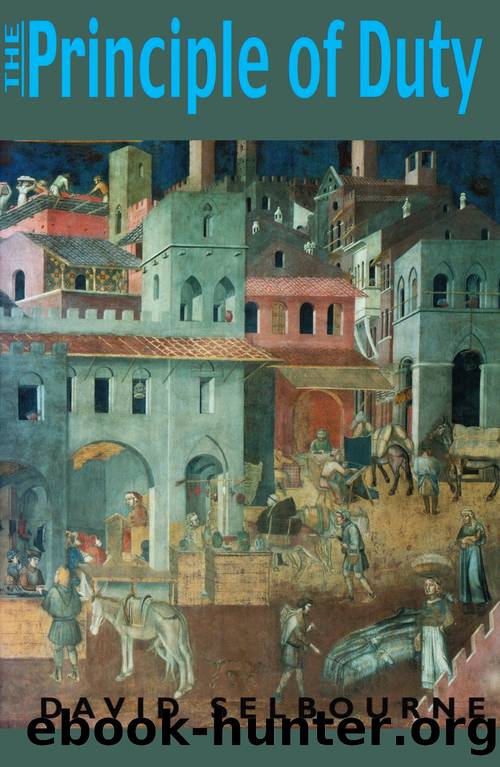Principle of Duty: An Essay on the Foundations of the Civic Order by David Selbourne

Author:David Selbourne [Selbourne, David]
Language: eng
Format: epub
Tags: Philosophy, Civics & Citizenship, Political Ideologies, Political Science, Conservatism & Liberalism, Political
ISBN: 9780268158866
Google: 9RwvDwAAQBAJ
Publisher: University of Notre Dame Pess
Published: 2001-01-26T12:52:35+00:00
SEVEN
* * *
The Principle of Duty in General (1)
The principle of duty defined â duty and liberty â self-restraint and self-harm â duty to self and to others â reciprocal obligation â duties to the civic order in general â duties to nature and to the past â duties of public service â democracy and active citizenship â Jerusalem and Athens â arguments of the religious â duty and right â the principle of duty as an ethical principle â the moral sense and moral knowledge â duty, reason and utility â civic coherence â equity â summary of argument â rejection of idea of covenant or contract â duty voluntarily undertaken and duty by imposition.
154. The principle of duty, the sovereign ethical principle of the civic order, demands both general and particular duties of the citizen â to himself, to his fellows, and to the civic order as a whole â and, likewise, general and particular duties of the civic order, and of its instrument the state, to its members. Such duties have their ground in ethics, reason, and utility. In their application to the citizen, they comport not obedience to power but co-responsibility for the well-being of others and of the civic order in general; have ethical precedence over the rights, benefits, and privileges with which the citizen is vested as a member of such civic order; and, fulfilled, signify that the individual who fulfils them is playing his citizenâs part.
The principle of duty is, in the first instance, that principle which regulates the relation between citizen and citizen, and the relation between the citizen and the civic order to which he belongs. It is, further, the fundamental principle of the civic bond and the heart of its ethic; that ethic, voluntarily assumed but sustained by law, which dictates to citizens that they compose a single civic order for whose well-being they are responsible in the common interest. The function of the principle of duty, whether its dictates are voluntarily assumed or enforced and reinforced by law, is the protection and maintenance of such civic bond, and thus of the civic order which it in turn upholds.
155. To observe the ethical and practical dictates of the principle of duty as they apply to the citizen is neither weakness nor strength in such citizen, but a moral imperative, a rational undertaking, and a practical necessity. For such observance is a precondition of any civic order whatever. In conditions of accelerating civic disaggregation, as in the corrupted liberal order, the imperative of the principle of duty is greatly increased; even where such conditions do not exist, the principle of duty is required to be observed, as the ground of the moral and practical relations between citizen and civic order. But where consciousness of the civic bond has waned, where citizens have turned strangers by the thousands and millions, and where obligation of all kinds â to oneself, to oneâs familiars, to the community, to the civic order â is contemplated
Download
This site does not store any files on its server. We only index and link to content provided by other sites. Please contact the content providers to delete copyright contents if any and email us, we'll remove relevant links or contents immediately.
What's Done in Darkness by Kayla Perrin(25490)
Shot Through the Heart: DI Grace Fisher 2 by Isabelle Grey(18208)
Shot Through the Heart by Mercy Celeste(18151)
The Fifty Shades Trilogy & Grey by E L James(17767)
The 3rd Cycle of the Betrayed Series Collection: Extremely Controversial Historical Thrillers (Betrayed Series Boxed set) by McCray Carolyn(13181)
The Subtle Art of Not Giving a F*ck by Mark Manson(12896)
Scorched Earth by Nick Kyme(11822)
Stepbrother Stories 2 - 21 Taboo Story Collection (Brother Sister Stepbrother Stepsister Taboo Pseudo Incest Family Virgin Creampie Pregnant Forced Pregnancy Breeding) by Roxi Harding(11014)
Drei Generationen auf dem Jakobsweg by Stein Pia(10209)
Suna by Ziefle Pia(10178)
Scythe by Neal Shusterman(9249)
International Relations from the Global South; Worlds of Difference; First Edition by Arlene B. Tickner & Karen Smith(8599)
Successful Proposal Strategies for Small Businesses: Using Knowledge Management ot Win Govenment, Private Sector, and International Contracts 3rd Edition by Robert Frey(8404)
This is Going to Hurt by Adam Kay(7681)
Dirty Filthy Fix: A Fixed Trilogy Novella by Laurelin Paige(6444)
He Loves Me...KNOT by RC Boldt(5796)
How to Make Love to a Negro Without Getting Tired by Dany LaFerrière(5367)
Interdimensional Brothel by F4U(5298)
Thankful For Her by Alexa Riley(5148)
